莎士比亚的诗
莎士比亚最著名的十首诗

莎士比亚最著名的十首诗篇一:莎士比亚是文艺复兴时期最重要的文学家之一,他的诗歌作品广受欢迎,其中一些作品被认为是莎士比亚最著名的十首诗。
以下是这些诗歌的标题和简要介绍:1. "As You Like It" (《欢乐颂》) - 这是莎士比亚最著名的诗歌之一,被认为是世界文学史上最伟大的诗歌之一。
这首诗歌以轻快的旋律和生动的人物形象描绘了一个贵族家庭的快乐时光。
2. "冬天的故事" (The Winter"s Tale,《冬天的故事》) - 这是莎士比亚最著名的喜剧之一,讲述了一个冬天的故事,其中包括许多戏剧性的场景和对话。
3. "冬天的故事" (The Winter"s Tale,《冬天的故事》) - 这是莎士比亚最著名的喜剧之一,讲述了一个冬天的故事,其中包括许多戏剧性的场景和对话。
4. "哈姆雷特" (Hagioagios,《哈姆雷特》) - 这是莎士比亚最著名的戏剧之一,讲述了一个悲剧性的故事,主人公哈姆雷特在复仇和生死之间挣扎。
5. "李尔王" (Lorelei,《李尔王》) - 这是莎士比亚最著名的悲剧之一,讲述了一个贵族人物李尔王的故事,他因为自己的错误和残忍而受到惩罚。
6. "暴风雨" (The Tempest,《暴风雨》) - 这是莎士比亚最著名的悲剧之一,讲述了一个海上冒险的故事,其中包括许多戏剧性的场景和人物关系。
7. "黎明" (Othello,《奥赛罗》) - 这是莎士比亚最著名的戏剧之一,讲述了一个海盗奥赛罗的故事,他在与伊莎贝拉的爱情和与敌人的战斗之间挣扎。
8. "哈姆雷特" (Hagioagios,《哈姆雷特》) - 这是莎士比亚最著名的喜剧之一,讲述了一个悲剧性的故事,主人公哈姆雷特在复仇和生死之间挣扎。
莎士比亚最著名的十首诗

莎士比亚最著名的十首诗篇一:莎士比亚是英国文学史上最伟大的作家之一,他的作品不仅涵盖了各种形式,包括戏剧、诗歌、散文等,而且被广泛认为是西方文学史上最伟大的文学作品之一。
他的诗歌作品数量众多,其中一些最著名的诗歌包括:1.《暴风雨》这是莎士比亚最著名的诗歌之一,也是他最具有代表性的作品之一。
这首诗描绘了一个平静而神秘的海滨小镇,暴风雨来临前的景象,以及小镇居民的平静生活和内心的平静。
这首诗表达了莎士比亚对平静生活和人性本质的热爱。
2.《爱的徒劳》《爱的徒劳》是莎士比亚的一部戏剧作品,也是他最受欢迎的作品之一。
这首诗描述了一个富有的家庭的儿子和一位贫穷的女孩之间的爱情故事。
这首诗强调了爱情的力量和人类的渴望,以及财富和社会地位的重要性。
3.《哈姆雷特》莎士比亚最著名的戏剧作品之一,也是他最具有代表性的作品之一。
这首诗描述了哈姆雷特的故事,他是一个富有的王子,他被他的叔叔谋杀,并被迫逃离他的国家。
这首诗表达了莎士比亚对人性的本质和人类命运的思考。
4.《鲁滨逊漂流记》这是莎士比亚的一首诗歌,描述了一个孤独的男子在荒岛上的生存之旅。
这首诗强调了人类的勇气和坚韧精神,以及在困境中的自我拯救能力。
5.《麦克白》莎士比亚的一首戏剧作品,讲述了一个王子的故事,他被他的两个兄弟谋杀,并试图篡位。
这首诗表达了莎士比亚对权力和人类欲望的思考,以及人类命运的无常和不可预测性。
6.《雅典的泰门》这是莎士比亚的一首诗歌,描述了一个富有的家庭的儿子,他因为贪婪而失去了所有的财富和地位。
这首诗强调了人类的欲望和贪婪,以及它们对人类幸福的影响。
7.《亨利五世》这是莎士比亚的一首戏剧作品,讲述了亨利五世的故事,他是一个强大的国王,他试图维护他的国家的利益。
这首诗表达了莎士比亚对权力和人类欲望的思考,以及人类命运的无常和不可预测性。
8.《麦克白》这是莎士比亚的一首诗歌,描述了一个孤独的男子在荒岛上的生存之旅。
篇二:莎士比亚是英国文学史上最伟大的作家之一,他的著作涵盖了多个领域,包括戏剧、诗歌、散文和小说等。
莎士比亚经典十四行诗附译文
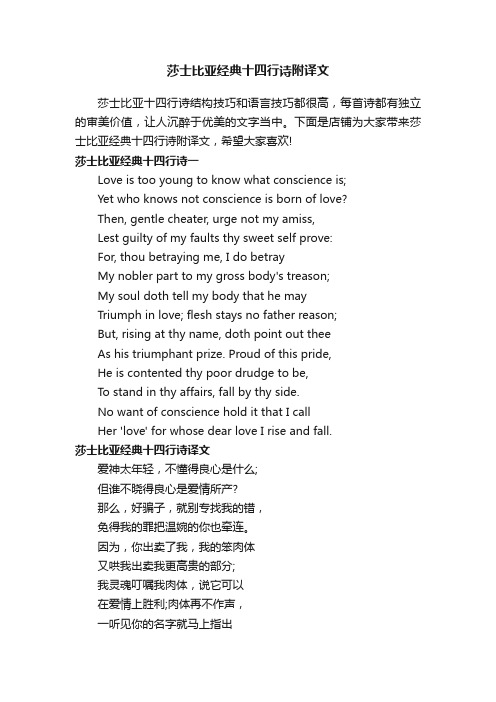
莎士比亚经典十四行诗附译文莎士比亚十四行诗结构技巧和语言技巧都很高,每首诗都有独立的审美价值,让人沉醉于优美的文字当中。
下面是店铺为大家带来莎士比亚经典十四行诗附译文,希望大家喜欢!莎士比亚经典十四行诗一Love is too young to know what conscience is;Yet who knows not conscience is born of love?Then, gentle cheater, urge not my amiss,Lest guilty of my faults thy sweet self prove:For, thou betraying me, I do betrayMy nobler part to my gross body's treason;My soul doth tell my body that he mayTriumph in love; flesh stays no father reason;But, rising at thy name, doth point out theeAs his triumphant prize. Proud of this pride,He is contented thy poor drudge to be,To stand in thy affairs, fall by thy side.No want of conscience hold it that I callHer 'love' for whose dear love I rise and fall.莎士比亚经典十四行诗译文爱神太年轻,不懂得良心是什么;但谁不晓得良心是爱情所产?那么,好骗子,就别专找我的错,免得我的罪把温婉的你也牵连。
因为,你出卖了我,我的笨肉体又哄我出卖我更高贵的部分;我灵魂叮嘱我肉体,说它可以在爱情上胜利;肉体再不作声,一听见你的名字就马上指出你是它的胜利品;它趾高气扬,死心蹋地作你最鄙贱的家奴,任你颐指气使,或倒在你身旁。
莎士比亚十四行诗
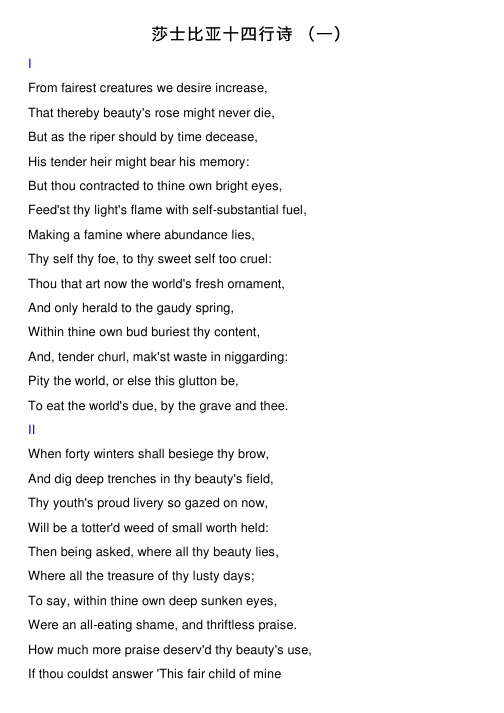
莎⼠⽐亚⼗四⾏诗(⼀)IFrom fairest creatures we desire increase,That thereby beauty's rose might never die,But as the riper should by time decease,His tender heir might bear his memory:But thou contracted to thine own bright eyes,Feed'st thy light's flame with self-substantial fuel, Making a famine where abundance lies,Thy self thy foe, to thy sweet self too cruel:Thou that art now the world's fresh ornament,And only herald to the gaudy spring,Within thine own bud buriest thy content,And, tender churl, mak'st waste in niggarding:Pity the world, or else this glutton be,To eat the world's due, by the grave and thee.IIWhen forty winters shall besiege thy brow,And dig deep trenches in thy beauty's field,Thy youth's proud livery so gazed on now,Will be a totter'd weed of small worth held:Then being asked, where all thy beauty lies,Where all the treasure of thy lusty days;To say, within thine own deep sunken eyes,Were an all-eating shame, and thriftless praise.How much more praise deserv'd thy beauty's use,If thou couldst answer 'This fair child of mineShall sum my count, and make my old excuse,' Proving his beauty by succession thine!This were to be new made when thou art old,And see thy blood warm when thou feel'st it cold. IIILook in thy glass and tell the face thou viewest Now is the time that face should form another; Whose fresh repair if now thou not renewest, Thou dost beguile the world, unbless some mother. For where is she so fair whose unear'd womb Disdains the tillage of thy husbandry?Or who is he so fond will be the tombOf his self-love, to stop posterity?Thou art thy mother's glass and she in theeCalls back the lovely April of her prime;So thou through windows of thine age shalt see, Despite of wrinkles this thy golden time.But if thou live, remember'd not to be,Die single and thine image dies with thee.IVUnthrifty loveliness, why dost thou spendUpon thy self thy beauty's legacy?Nature's bequest gives nothing, but doth lend, And being frank she lends to those are free: Then, beauteous niggard, why dost thou abuse The bounteous largess given thee to give? Profitless usurer, why dost thou useSo great a sum of sums, yet canst not live?For having traffic with thy self alone,Thou of thy self thy sweet self dost deceive:Then how when nature calls thee to be gone, What acceptable audit canst thou leave?Thy unused beauty must be tombed with thee, Which, used, lives th' executor to be.VThose hours, that with gentle work did frameThe lovely gaze where every eye doth dwell,Will play the tyrants to the very sameAnd that unfair which fairly doth excel;For never-resting time leads summer onTo hideous winter, and confounds him there;Sap checked with frost, and lusty leaves quite gone, Beauty o'er-snowed and bareness every where: Then were not summer's distillation left,A liquid prisoner pent in walls of glass,Beauty's effect with beauty were bereft,Nor it, nor no remembrance what it was:But flowers distill'd, though they with winter meet, Leese but their show; their substance still lives sweet.VIThen let not winter's ragged hand deface,In thee thy summer, ere thou be distilled:Make sweet some vial; treasure thou some placeWith beauty's treasure ere it be self-killed.That use is not forbidden usury,Which happies those that pay the willing loan; That's for thy self to breed another thee,Or ten times happier, be it ten for one;Ten times thy self were happier than thou art,If ten of thine ten times refigured thee:Then what could death do if thou shouldst depart, Leaving thee living in posterity?Be not self-willed, for thou art much too fairTo be death's conquest and make worms thine heir.VIILo! in the orient when the gracious lightLifts up his burning head, each under eyeDoth homage to his new-appearing sight, Serving with looks his sacred majesty;And having climbed the steep-up heavenly hill, Resembling strong youth in his middle age,Yet mortal looks adore his beauty still, Attending on his golden pilgrimage:But when from highmost pitch, with weary car, Like feeble age, he reeleth from the day,The eyes, 'fore duteous, now converted are From his low tract, and look another way:So thou, thyself outgoing in thy noon Unlooked on diest unless thou get a son.VIIIMusic to hear, why hear'st thou music sadly? Sweets with sweets war not, joy delights in joy: Why lov'st thou that which thou receiv'st not gladly, Or else receiv'st with pleasure thine annoy?If the true concord of well-tuned sounds,By unions married, do offend thine ear,They do but sweetly chide thee, who confoundsIn singleness the parts that thou shouldst bear. Mark how one string, sweet husband to another, Strikes each in each by mutual ordering; Resembling sire and child and happy mother, Who, all in one, one pleasing note do sing: Whose speechless song being many, seeming one, Sings this to thee: 'Thou single wilt prove none.'IXIs it for fear to wet a widow's eye,That thou consum'st thy self in single life?Ah! if thou issueless shalt hap to die,The world will wail thee like a makeless wife;The world will be thy widow and still weepThat thou no form of thee hast left behind,When every private widow well may keepBy children's eyes, her husband's shape in mind: Look what an unthrift in the world doth spend Shifts but his place, for still the world enjoys it;But beauty's waste hath in the world an end,And kept unused the user so destroys it.No love toward others in that bosom sitsThat on himself such murd'rous shame commits.XFor shame deny that thou bear'st love to any,Who for thy self art so unprovident.Grant, if thou wilt, thou art beloved of many,But that thou none lov'st is most evident:For thou art so possessed with murderous hate, That 'gainst thy self thou stick'st not to conspire, Seeking that beauteous roof to ruinateWhich to repair should be thy chief desire.O! change thy thought, that I may change my mind: Shall hate be fairer lodged than gentle love?Be, as thy presence is, gracious and kind,Or to thyself at least kind-hearted prove:Make thee another self for love of me,That beauty still may live in thine or thee.XIAs fast as thou shalt wane, so fast thou grow'stIn one of thine, from that which thou departest;And that fresh blood which youngly thou bestow'st, Thou mayst call thine when thou from youth convertest. Herein lives wisdom, beauty, and increase;Without this folly, age, and cold decay:If all were minded so, the times should ceaseAnd threescore year would make the world away.Let those whom nature hath not made for store,Harsh, featureless, and rude, barrenly perish:Look whom she best endow'd, she gave the more; Which bounteous gift thou shouldst in bounty cherish: She carv'd thee for her seal, and meant thereby,Thou shouldst print more, not let that copy die.XIIWhen I do count the clock that tells the time,And see the brave day sunk in hideous night; When I behold the violet past prime,And sable curls, all silvered o'er with white;When lofty trees I see barren of leaves,Which erst from heat did canopy the herd,And summer's green all girded up in sheaves, Borne on the bier with white and bristly beard, Then of thy beauty do I question make,That thou among the wastes of time must go, Since sweets and beauties do themselves forsake And die as fast as they see others grow;And nothing 'gainst Time's scythe can make defence Save breed, to brave him when he takes thee hence.XIIIO! that you were your self; but, love, you areNo longer yours, than you your self here live: Against this coming end you should prepare,And your sweet semblance to some other give:So should that beauty which you hold in leaseFind no determination; then you wereYourself again, after yourself's decease,When your sweet issue your sweet form should bear. Who lets so fair a house fall to decay,Which husbandry in honour might uphold,Against the stormy gusts of winter's dayAnd barren rage of death's eternal cold?O! none but unthrifts. Dear my love, you know,You had a father: let your son say so.XIVNot from the stars do I my judgement pluck;And yet methinks I have Astronomy,But not to tell of good or evil luck,Of plagues, of dearths, or seasons' quality;Nor can I fortune to brief minutes tell,Pointing to each his thunder, rain and wind,Or say with princes if it shall go wellBy oft predict that I in heaven find:But from thine eyes my knowledge I derive,And, constant stars, in them I read such artAs truth and beauty shall together thrive,If from thyself, to store thou wouldst convert;Or else of thee this I prognosticate:Thy end is truth's and beauty's doom and date.XVWhen I consider every thing that growsHolds in perfection but a little moment,That this huge stage presenteth nought but shows Whereon the stars in secret influence comment; When I perceive that men as plants increase, Cheered and checked even by the self-same sky, Vaunt in their youthful sap, at height decrease, And wear their brave state out of memory;Then the conceit of this inconstant staySets you most rich in youth before my sight, Where wasteful Time debateth with decayTo change your day of youth to sullied night, And all in war with Time for love of you,As he takes from you, I engraft you new.XVIBut wherefore do not you a mightier wayMake war upon this bloody tyrant, Time?And fortify your self in your decayWith means more blessed than my barren rhyme? Now stand you on the top of happy hours,And many maiden gardens, yet unset,With virtuous wish would bear you living flowers, Much liker than your painted counterfeit:So should the lines of life that life repair,Which this, Time's pencil, or my pupil pen, Neither in inward worth nor outward fair,Can make you live your self in eyes of men.To give away yourself, keeps yourself still,And you must live, drawn by your own sweetskill.XVIIWho will believe my verse in time to come,If it were fill'd with your most high deserts? Though yet heaven knows it is but as a tomb Which hides your life, and shows not half your parts. If I could write the beauty of your eyes,And in fresh numbers number all your graces,The age to come would say 'This poet lies;Such heavenly touches ne'er touch'd earthly faces.' So should my papers, yellow'd with their age,Be scorn'd, like old men of less truth than tongue, And your true rights be term'd a poet's rageAnd stretched metre of an antique song:But were some child of yours alive that time,You should live twice, in it, and in my rhyme.XVIIIShall I compare thee to a summer's day?Thou art more lovely and more temperate:Rough winds do shake the darling buds of May, And summer's lease hath all too short a date: Sometime too hot the eye of heaven shines,And often is his gold complexion dimmed,And every fair from fair sometime declines,By chance, or nature's changing course untrimmed: But thy eternal summer shall not fade,Nor lose possession of that fair thou ow'st,Nor shall death brag thou wander'st in his shade, When in eternal lines to time thou grow'st,So long as men can breathe, or eyes can see,So long lives this, and this gives life to thee.XIXDevouring Time, blunt thou the lion's paws,And make the earth devour her own sweet brood; Pluck the keen teeth from the fierce tiger's jaws, And burn the long-liv'd phoenix, in her blood; Make glad and sorry seasons as thou fleet'st, And do whate'er thou wilt, swift-footed Time,To the wide world and all her fading sweets;But I forbid thee one most heinous crime:O! carve not with thy hours my love's fair brow, Nor draw no lines there with thine antique pen; Him in thy course untainted do allowFor beauty's pattern to succeeding men.Yet, do thy worst old Time: despite thy wrong,My love shall in my verse ever live young.XXA woman's face with nature's own hand painted, Hast thou, the master mistress of my passion;A woman's gentle heart, but not acquaintedWith shifting change, as is false women's fashion: An eye more bright than theirs, less false in rolling, Gilding the object whereupon it gazeth;A man in hue all hues in his controlling,Which steals men's eyes and women's souls amazeth. And for a woman wert thou first created;Till Nature, as she wrought thee, fell a-doting,And by addition me of thee defeated,By adding one thing to my purpose nothing.But since she prick'd thee out for women's pleasure, Mine be thy love and thy love's use theirtreasure.XXISo is it not with me as with that Muse,Stirred by a painted beauty to his verse,Who heaven itself for ornament doth useAnd every fair with his fair doth rehearse,Making a couplement of proud compareWith sun and moon, with earth and sea's rich gems, With April's first-born flowers, and all things rare, That heaven's air in this huge rondure hems.O! let me, true in love, but truly write,And then believe me, my love is as fairAs any mother's child, though not so brightAs those gold candles fixed in heaven's air:Let them say more that like of hearsay well;I will not praise that purpose not to sell.XXIIMy glass shall not persuade me I am old,So long as youth and thou are of one date;But when in thee time's furrows I behold,Then look I death my days should expiate. For all that beauty that doth cover thee,Is but the seemly raiment of my heart, Which in thy breast doth live, as thine in me: How can I then be elder than thou art?O! therefore love, be of thyself so waryAs I, not for myself, but for thee will; Bearing thy heart, which I will keep so chary As tender nurse her babe from faring ill. Presume not on thy heart when mine is slain, Thou gav'st me thine not to give back again.。
莎士比亚最著名的十首诗

莎士比亚最著名的十首诗莎士比亚是英国文艺复兴时期最著名的文学家之一,他的创作涵盖了诗歌、戏剧、散文等多个领域。
以下是莎士比亚最著名的十首诗,以及它们的简要介绍和拓展:1. 《麦克白》中的《在选择未来的日子》一诗:这是莎士比亚最著名的戏剧之一,也是他最著名的诗作之一。
这首诗以麦克白为主角,描述了他内心的矛盾和选择。
诗中麦克白试图选择一种道德的道路,但最终他发现只有孤独和死亡才是他真正的选择。
2. 《暴风雨》中的《论人类不平等的起源和基础》一诗:这是莎士比亚的一部戏剧,也是他的代表作之一。
这首诗探讨了人类不平等的起源和基础,呼吁人们关注社会问题。
3. 《阿浮》中的《论爱情》一诗:这是莎士比亚的一部喜剧,讲述了一个贵族人物阿浮的爱情和生活。
诗中阿浮表达了对爱情和生活的思考,强调了爱情的重要性。
4. 《黎明前的黑暗》中的《论友谊》一诗:这是莎士比亚的一部戏剧,讲述了两个朋友之间的纠葛。
诗中表达了友谊的重要性,并呼吁人们珍惜友谊。
5. 《李尔王》中的《论智慧的重要性》一诗:这是莎士比亚的一部戏剧,讲述了一个国王李尔王的故事。
诗中表达了智慧的重要性,教导人们如何聪明地处理问题。
6. 《哈姆雷特》中的《论复仇》一诗:这是莎士比亚的一部著名戏剧,也是他的代表作之一。
诗中哈姆雷特试图复仇,但最终意识到复仇并不能解决问题,而是会导致更多的伤害。
7. 《暴风雨》中的《论命运》一诗:这是莎士比亚的一部戏剧,讲述了命运对麦克白和奥赛罗的影响。
诗中麦克白试图反抗命运,但最终意识到命运是不可改变的。
8. 《雅典娜的智慧》中的《论智慧与美貌》一诗:这是莎士比亚的一部诗歌,讲述了智慧与美貌之间的关系。
诗中雅典娜教导人们如何权衡利弊,强调了美貌和智慧的重要性。
9. 《罗密欧与朱丽叶》中的《论爱情与仇恨》一诗:这是莎士比亚的一部著名戏剧,也是他的代表作之一。
诗中罗密欧试图选择一种道德的道路,但最终意识到只有孤独和死亡才是他真正的选择。
莎士比亚十四行诗18首
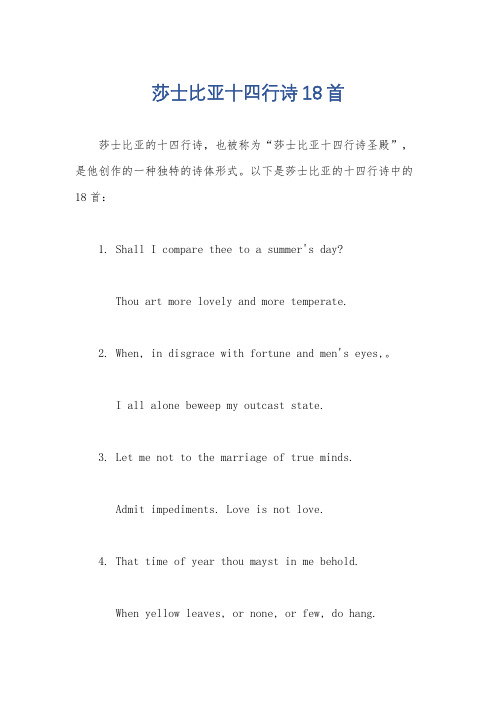
莎士比亚十四行诗18首莎士比亚的十四行诗,也被称为“莎士比亚十四行诗圣殿”,是他创作的一种独特的诗体形式。
以下是莎士比亚的十四行诗中的18首:1. Shall I compare thee to a summer's day?Thou art more lovely and more temperate.2. When, in disgrace with fortune and men's eyes,。
I all alone beweep my outcast state.3. Let me not to the marriage of true minds.Admit impediments. Love is not love.4. That time of year thou mayst in me behold.When yellow leaves, or none, or few, do hang.5. My mistress' eyes are nothing like the sun;Coral is far more red than her lips' red.6. When my love swears that she is made of truth,。
I do believe her, though I know she lies.7. When to the sessions of sweet silent thought.I summon up remembrance of things past.8. From fairest creatures we desire increase,。
That thereby beauty's rose might never die.9. O thou, my lovely boy, who in thy power.Dost hold Time's fickle glass, his sickle, hour.10. That you were once unkind befriends me now,。
莎士比亚著名十四行诗三首
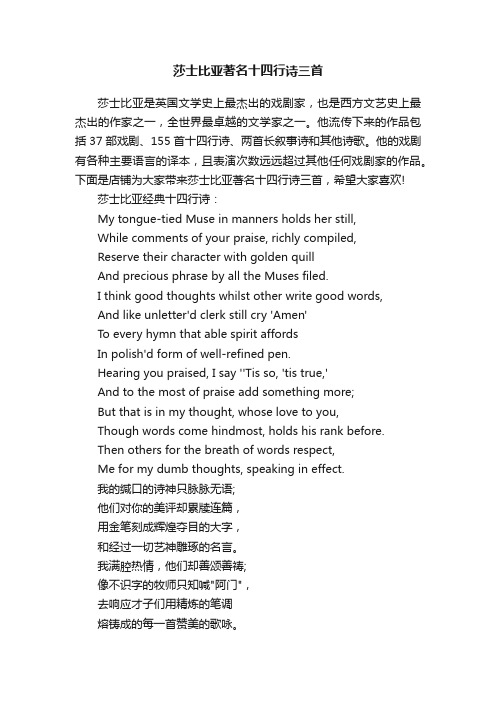
莎士比亚著名十四行诗三首莎士比亚是英国文学史上最杰出的戏剧家,也是西方文艺史上最杰出的作家之一,全世界最卓越的文学家之一。
他流传下来的作品包括37部戏剧、155首十四行诗、两首长叙事诗和其他诗歌。
他的戏剧有各种主要语言的译本,且表演次数远远超过其他任何戏剧家的作品。
下面是店铺为大家带来莎士比亚著名十四行诗三首,希望大家喜欢!莎士比亚经典十四行诗:My tongue-tied Muse in manners holds her still,While comments of your praise, richly compiled,Reserve their character with golden quillAnd precious phrase by all the Muses filed.I think good thoughts whilst other write good words,And like unletter'd clerk still cry 'Amen'To every hymn that able spirit affordsIn polish'd form of well-refined pen.Hearing you praised, I say ''Tis so, 'tis true,'And to the most of praise add something more;But that is in my thought, whose love to you,Though words come hindmost, holds his rank before.Then others for the breath of words respect,Me for my dumb thoughts, speaking in effect.我的缄口的诗神只脉脉无语;他们对你的美评却累牍连篇,用金笔刻成辉煌夺目的大字,和经过一切艺神雕琢的名言。
莎士比亚十四行诗
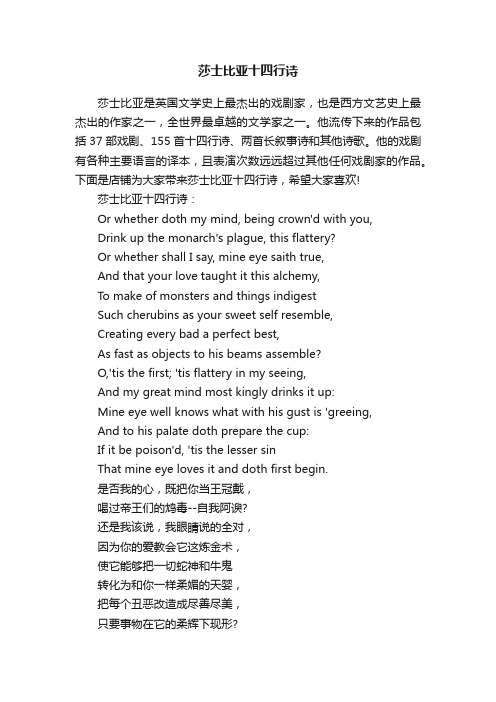
莎士比亚十四行诗莎士比亚是英国文学史上最杰出的戏剧家,也是西方文艺史上最杰出的作家之一,全世界最卓越的文学家之一。
他流传下来的作品包括37部戏剧、155首十四行诗、两首长叙事诗和其他诗歌。
他的戏剧有各种主要语言的译本,且表演次数远远超过其他任何戏剧家的作品。
下面是店铺为大家带来莎士比亚十四行诗,希望大家喜欢!莎士比亚十四行诗:Or whether doth my mind, being crown'd with you,Drink up the monarch's plague, this flattery?Or whether shall I say, mine eye saith true,And that your love taught it this alchemy,To make of monsters and things indigestSuch cherubins as your sweet self resemble,Creating every bad a perfect best,As fast as objects to his beams assemble?O,'tis the first; 'tis flattery in my seeing,And my great mind most kingly drinks it up:Mine eye well knows what with his gust is 'greeing,And to his palate doth prepare the cup:If it be poison'd, 'tis the lesser sinThat mine eye loves it and doth first begin.是否我的心,既把你当王冠戴,喝过帝王们的鸩毒--自我阿谀?还是我该说,我眼睛说的全对,因为你的爱教会它这炼金术,使它能够把一切蛇神和牛鬼转化为和你一样柔媚的天婴,把每个丑恶改造成尽善尽美,只要事物在它的柔辉下现形?哦,是前者;是眼睛的自我陶醉,我伟大的心灵把它一口喝尽:眼睛晓得投合我心灵的口味,为它准备好这杯可口的毒饮。
莎士比亚的诗

莎士比亚的诗莎士比亚(1564年4月23日-1616年4月23日),华人社会常尊称为莎翁,是英国文学史上最杰出的戏剧家,也是欧洲文艺复兴时期最重要、最伟大的作家之一,当时人文主义文学的集大成者,以及全世界最卓越的文学家之一。
莎士比亚诗如下:1、《十四行诗》当我看到,一切生长之物,只在刹那间能够完美;世界舞台上一无所有,唯有星辰在秘密中牵引。
我看到人类像草木一样生长,被同样的天空赋予盛衰。
少时繁茂,日中则仄,一切美好都从记忆中被抹去!于是这瞬间停留的诡计,让你青春的容颜出现在我面前。
而残暴的时间和腐朽商议,要把你青春的白日变成暗淡黑夜,为了爱你,我将和时间对抗,它从你身上夺走的,我会重新嫁接。
2、《哈姆雷特》内心之事宜缄口,仓促之念莫妄行,为人友善忌轻浮,患难之友可深交,酒肉之情应远离。
3、《哈姆雷特》生存或毁灭,这是个必答之问题:是否应默默的忍受坎坷命运之无情打击,还是应与深如大海之无涯苦难奋然为敌,并将其克服。
此二抉择,究竟是哪个较崇高?死即睡眠,它不过如此!倘若一眠能了结心灵之苦楚与肉体之百患,那么,此结局是可盼的!死去,睡去……但在睡眠中可能有梦,啊,这就是个阻碍:当我们摆脱了此垂死之皮囊,在死之长眠中会有何梦来临?它令我们踌躇,使我们心甘情愿的承受长年之灾,否则谁肯容忍人间之百般折磨,如暴君之政、骄者之傲、失恋之痛、法章之慢、贪官之侮、或庸民之辱,假如他能简单的一刃了之?还有谁会肯去终生做牛做马。
莎士比亚笔下最美的10首经典爱情诗,一生至少要读一次!

莎士比亚笔下最美的10首经典爱情诗,一生至少要读一次!莎士比亚,英国国民诗人、剧作家、演员,无需赘言的世界名家,创作了大量被认为是“不朽绝唱”的旷世巨作,包括近40部剧本、154首十四行诗及2首长诗。
人们尊称他为“莎翁”,其十四行诗的诗体独树一帜,更被称为“莎体”。
1据说小爱神有一次睡得挺熟,把点燃爱火的火炬放在身边,这时一群要守身如玉的宁芙正好从旁边经过,步履翩然;最美的一位仙女偷取了火炬,因它曾在无数心中把火点旺,于是爱情的主宰在酣睡之时被一只贞洁的手解除了武装。
仙女在附近的冷泉把火浸灭,冷泉因爱火永远变成了温泉,这温泉能治疗百病祛瘟除邪;可当我被情人弄得神倒魂颠,去那温泉求治才证实这一真情:爱火能烧热水却不会被水浇冷。
2听音乐,你为何听音乐会悲郁?快活不伤快活,欢笑喜爱欢笑。
你为何喜欢你不愿接受的东西,或为何要心甘情愿地接受烦恼?假若几个悦耳的声部和谐相配,构成真正的复调把你耳朵冒犯,它们也只是在轻言细语地责备你用孤弦糟蹋你本该奏的和弦。
请听一根弦与另一根弦相呼应,怎样用协调的和声演奏出音乐,就像父亲、儿子和快乐的母亲,异口同声地唱着一支动听的歌。
他们的无字之歌似乎异调同音,对你唱着:“你弦孤终难曲成。
”3当我想到生长于世间的万物繁荣鼎盛都不过在朝夕之间,而这座巨大舞台上演的剧目无不受制于星宿无声的褒贬;当我看到世人像草木般蕃息,甚至被同一苍昊劭励和惩戒,少时气盛争荣,过盛而衰替,靡丽纷华终成烟云被人忘却;于是我对这无常浮生之领悟便把正值绮年的你唤到眼前,便看见无情岁月与衰颓共谋,要把你青春的旦昼变成夜晚;我要同时间抗争,为了爱你,它把你摧折,我接你于新枝。
4在未来之日谁会相信我的诗文,即使通篇都是对你优点的赞歌? 唯有上天还知道它是一座坟茔,埋着你的生命,难显你的本色。
纵然我能够写出你眼睛之漂亮,用清词丽句绘尽你的俊秀翩然,将来的人也会说“这诗人撒谎;神笔天工绝不刻画凡夫的容颜”。
于是我这些被岁月染黄的诗章会被当作聒絮的老叟遭人嘲笑,你应得之赞美则成诗人的狂想,被说成是一首夸张的古老歌谣:但如果那时你有个孩子活在凡尘,你将在他身上和我诗里双重永生。
莎士比亚最著名的十首诗

莎士比亚最著名的十首诗威廉·莎士比亚,被誉为“英国国宝”,是世界文学史上最伟大的戏剧家和诗人之一。
他的作品充满了深邃的思想、丰富的人性描绘和独特的艺术风格。
在这篇长篇范文中,我们将探讨莎士比亚最著名的十首诗。
一、《哈姆雷特》《哈姆雷特》是莎士比亚的杰作,讲述了丹麦王子哈姆雷特为报父仇而与敌人斗争的故事。
这部作品以其复杂的情节、深刻的人物塑造和独白的艺术形式而闻名。
二、《罗密欧与朱丽叶》《罗密欧与朱丽叶》是一部描绘两位年轻恋人的悲剧故事。
这部作品以其浪漫的情感、悲剧的结局和对爱情的赞美而著称。
三、《奥赛罗》《奥赛罗》是一部关于嫉妒和背叛的悲剧。
这部作品以其紧张的情节、深刻的人物塑造和心理描绘而备受赞誉。
四、《麦克白》《麦克白》是一部关于权力、野心和背叛的悲剧。
这部作品以其深刻的人物塑造、独特的艺术风格和紧张的情节而著称。
五、《李尔王》《李尔王》是一部关于权力、背叛和悲剧的故事。
这部作品以其深刻的社会寓言、悲剧的结局和深刻的人物塑造而著称。
六、《威尼斯商人》《威尼斯商人》是一部关于金钱、爱情和人性的故事。
这部作品以其深刻的主题、丰富的人物塑造和独特的艺术风格而著称。
七、《皆大欢喜》《皆大欢喜》是一部关于爱情、友谊和自由的故事。
这部作品以其轻松愉快的情节、深刻的人物塑造和独特的艺术风格而著称。
八、《第十二夜》《第十二夜》是一部关于爱情、冒险和奇迹的故事。
这部作品以其浪漫的情感、喜剧的情节和深刻的人物塑造而著称。
九、《暴风雨》《暴风雨》是一部关于自然、人类和复仇的故事。
这部作品以其深刻的主题、独特的表现形式和深刻的人物塑造而著称。
十、《泰特斯·安德洛尼克斯》《泰特斯·安德洛尼克斯》是一部关于复仇、暴力和悲剧的故事。
这部作品以其紧张的情节、深刻的人物塑造和独特的艺术风格而著称。
以上是莎士比亚最著名的十首诗的简要介绍。
这些作品不仅代表了莎士比亚的艺术成就,也是世界文学宝库中的珍品。
莎士比亚最著名的十首诗

莎士比亚最著名的十首诗篇一:莎士比亚是英国文学史上最伟大的作家之一,他的作品不仅涵盖了各种类型的文学,还包括了许多著名的诗歌。
以下是莎士比亚最著名的十首诗,它们涵盖了不同的主题和情感,从对爱情的赞美到对人生的反思,再到对命运的思考和探索。
1. 《威尼斯商人》中的“仁爱慈悲”这首诗是莎士比亚最著名的诗歌之一,也是他的代表作之一。
这首诗描述了一个商人的故事,他在生意上非常成功,但却失去了自己的仁爱和慈悲。
这首诗强调了人类的情感和道德,并呼吁人们在生活中应该追求仁爱和慈悲。
2. 《哈姆雷特》中的“命运的思考”这首诗是莎士比亚最著名的悲剧之一《哈姆雷特》中的结尾,它描绘了哈姆雷特在战斗中死亡的场景。
这首诗强调了命运的不可预测性和人类在命运面前的无力感。
它也成为了莎士比亚最著名的诗歌之一,被广泛传颂和研究。
3. 《奥赛罗》中的“妒忌”这首诗是莎士比亚最著名的悲剧之一《奥赛罗》中的开头,它描绘了奥赛罗因为妒忌而产生了邪恶的想法,最终导致了他的死亡。
这首诗强调了人类内心的阴暗面,以及妒忌和仇恨对人类的影响。
4. 《李尔王》中的“爱情的赞美”这首诗是莎士比亚最著名的喜剧之一《李尔王》中的结尾,它描绘了李尔王对他的女儿的赞美,表达了对爱情的赞美和渴望。
这首诗成为了莎士比亚最著名的诗歌之一,被广泛传颂和研究。
5. 《麦克白》中的“命运的复仇”这首诗是莎士比亚最著名的悲剧之一《麦克白》中的结尾,它描绘了麦克白在完成了他的计划后,最终被命运所惩罚。
这首诗强调了人类对命运的无力感,以及命运的复仇和对人类的影响。
6. 《暴风雨》中的“人类的渺小”这首诗是莎士比亚最著名的传奇剧之一《暴风雨》中的开头,它描绘了一个神秘的岛屿,以及人类在这个岛屿上渺小的地位。
这首诗强调了人类在自然面前的无力感和敬畏感。
7. 《辛白林》中的“仁爱的赞美”这首诗是莎士比亚最著名的传奇剧之一《辛白林》中的结尾,它描绘了辛白林对他的敌人的赞美,表达了对仁爱和慈悲的赞美。
莎士比亚诗歌
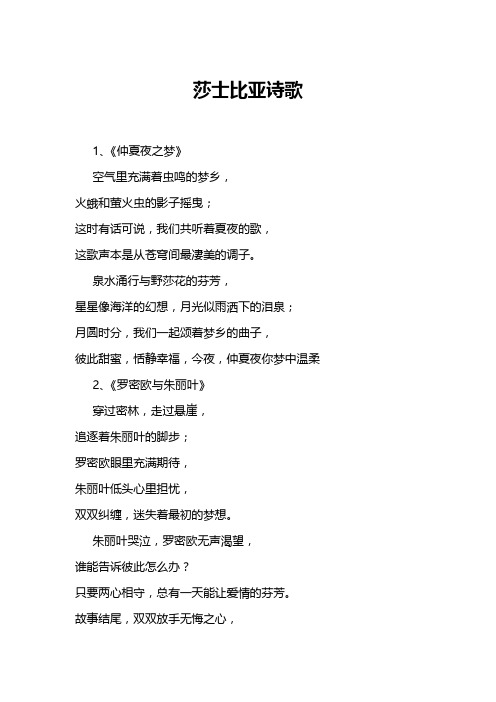
莎士比亚诗歌
1、《仲夏夜之梦》
空气里充满着虫鸣的梦乡,
火蛾和萤火虫的影子摇曳;
这时有话可说,我们共听着夏夜的歌,
这歌声本是从苍穹间最凄美的调子。
泉水涌行与野莎花的芬芳,
星星像海洋的幻想,月光似雨洒下的泪泉;
月圆时分,我们一起颂着梦乡的曲子,
彼此甜蜜,恬静幸福,今夜,仲夏夜你梦中温柔
2、《罗密欧与朱丽叶》
穿过密林,走过悬崖,
追逐着朱丽叶的脚步;
罗密欧眼里充满期待,
朱丽叶低头心里担忧,
双双纠缠,迷失着最初的梦想。
朱丽叶哭泣,罗密欧无声渴望,
谁能告诉彼此怎么办?
只要两心相守,总有一天能让爱情的芬芳。
故事结尾,双双放手无悔之心,
只要彼此心有情,爱情就会永远存在。
莎士比亚十四行诗带翻译

莎士比亚十四行诗带翻译莎士比亚的十四行诗语汇丰富、用词洗练、比喻新颖、结构巧妙、音调铿锵悦耳、张弛有度,让人印象深刻。
下面是店铺为大家带来莎士比亚十四行诗带翻译,供大家阅读欣赏!莎士比亚十四行诗1Then let not winter's ragged hand deface你还没提炼出香精,那你就别让In thee thy summer ere thou be distilled.严冬的粗手来抹掉你脸上的盛夏:Make sweet some vial; treasure thou some place你教玉瓶生香吧;用美的宝藏With beauty's treasure ere it be self-killed.使福地生光吧,趁它还没有自杀。
That use is not forbidden usury取这种重利并不是犯禁放高利贷,Which happies those that pay the willing loan;它能够教愿意还债的人们高兴;That's for thyself to breed another thee,这正是要你生出另一个你来,Or ten times happier be it ten for one.或高兴十倍,要是你一人生十人;Ten times thyself were happier than thou art,你十个儿女描画你十幅肖像,If ten of thine ten times refigured thee:你就要比你独个儿添十倍欢乐:Then what could death do if thou shouldst depart,你将来去世时,死神能把你怎样,Leaving thee living in posterity?既然在后代身上你永远存活?Be not self-willed, for thou art much too fair,别刚愎自用,你太美丽了,不应该To be death's conquest and make worms thine heir.让死神掳去、教蛆虫做你的后代。
莎士比亚十四行诗中文

莎士比亚十四行诗中文一对天生的尤物我们要求蕃盛,以便美的玫瑰永远不会枯死,但开透的花朵既要及时雕零,就应把记忆交给娇嫩的后嗣;但你,只和你自己的明眸定情,把自己当燃料喂养眼中的火焰,和自己作对,待自己未免太狠,把一片丰沃的土地变成荒田。
你现在是大地的清新的点缀,又是锦绣阳春的唯一的前锋,为什么把富源葬送在嫩蕊里,温柔的鄙夫,要吝啬,反而浪用,可怜这个世界吧,要不然,贪夫,就吞噬世界的份,由你和坟墓。
二当四十个冬天围攻你的朱颜,在你美的园地挖下深的战壕,你青春的华服,那么被人艳羡,将成褴褛的败絮,谁也不要瞧:那时人若问起你的美在何处,哪里是你那少壮年华的宝藏,你说,“在我这双深陷的眼眶里,是贪婪的羞耻,和无益的颂扬。
” 你的美的用途会更值得赞美,如果你能够说,“我这宁馨小童将总结我的账,宽恕我的老迈,” 证实他的美在继承你的血统~这将使你在衰老的暮年更生,并使你垂冷的血液感到重温。
三照照镜子,告诉你那镜中的脸庞,说现在这庞儿应该另造一副;如果你不赶快为它重修殿堂,就欺骗世界,剥掉母亲的幸福。
因为哪里会有女人那么淑贞她那处女的胎不愿被你耕种,哪里有男人那么蠢,他竟甘心做自己的坟墓,绝自己的血统, 你是你母亲的镜子,在你里面她唤回她的盛年的芳菲四月:同样,从你暮年的窗你将眺见——纵皱纹满脸——你这黄金的岁月。
但是你活着若不愿被人惦记,就独自死去,你的肖像和你一起。
四俊俏的浪子,为什么把你那份美的遗产在你自己身上耗尽, 造化的馈赠非赐予,她只出赁; 她慷慨,只赁给宽宏大量的人。
那么,美丽的鄙夫,为什么滥用那交给你转交给别人的厚礼, 赔本的高利贷者,为什么浪用那么一笔大款,还不能过日子, 因为你既然只和自己做买卖,就等于欺骗你那妩媚的自我。
这样,你将拿什么账目去交代,当造化唤你回到她怀里长卧, 你未用过的美将同你进坟墓; 用呢,就活着去执行你的遗嘱。
五那些时辰曾经用轻盈的细工织就这众目共注的可爱明眸,终有天对它摆出魔王的面孔,把绝代佳丽剁成龙锺的老丑: 因为不舍昼夜的时光把盛夏带到狰狞的冬天去把它结果; 生机被严霜窒息,绿叶又全下,白雪掩埋了美,满目是赤裸裸: 那时候如果夏天尚未经提炼,让它凝成香露锁在玻璃瓶里,美和美的流泽将一起被截断,美,和美的记忆都无人再提起: 但提炼过的花,纵和冬天抗衡,只失掉颜色,却永远吐着清芬。
莎士比亚的诗句

莎士比亚的诗句(实用版)编制人:__________________审核人:__________________审批人:__________________编制单位:__________________编制时间:____年____月____日序言下载提示:该文档是本店铺精心编制而成的,希望大家下载后,能够帮助大家解决实际问题。
文档下载后可定制修改,请根据实际需要进行调整和使用,谢谢!并且,本店铺为大家提供各种类型的实用范文,如句子大全、说说大全、标语大全、口号大全、心语大全、经典语录、名人名言、个性签名、祝福语、幽默笑话等等,想了解不同范文格式和写法,敬请关注!Download tips: This document is carefully compiled by this editor. I hope that after you download it, it can help you solve practical problems. The document can be customized and modified after downloading, please adjust and use it according to actual needs, thank you!In addition, this store provides various types of practical sample essays for everyone, such as sentences, sayings, slogans, slogans, heart words, classic quotations, famous quotes, personalized signatures, blessings, humorous jokes, etc. Learn about the different formats and writing styles of sample essays, so stay tuned!莎士比亚的诗句1、黑暗无论怎样悠长,白昼总会到来。
莎士比亚著名诗歌

莎士比亚是一位著名的英国诗人和剧作家,他的诗歌和戏剧作品在世界文学中有着广泛的影响。
以下是莎士比亚的一些著名诗歌:
1.《哈姆雷特》中的“生存还是毁灭,这是个问题”:这是莎士比亚最著名的台词之
一,也是《哈姆雷特》这部悲剧的核心主题。
2.《罗密欧与朱丽叶》中的“罗密欧与朱丽叶的悲剧”:这是莎士比亚的一部悲剧作
品,讲述了两个年轻恋人的悲惨命运。
3.《十四行诗集》中的“第18首”:这是莎士比亚的代表作之一,也是他最著名的十
四行诗之一。
这首诗表达了作者对时间的感慨和对生命的思考。
4.《奥赛罗》中的“嫉妒是绿色的火焰”:这是莎士比亚的一部悲剧作品,讲述了奥赛
罗因为嫉妒而杀死自己妻子的故事。
5.《麦克白》中的“人生不过是一个行走的影子”:这是莎士比亚的一部悲剧作品,讲
述了麦克白为了权力而不择手段的故事。
以上只是莎士比亚的一些著名诗歌和戏剧作品,他的作品数量庞大,且涵盖了各种主题和情感,对世界文学产生了深远的影响。
莎士比亚诗名
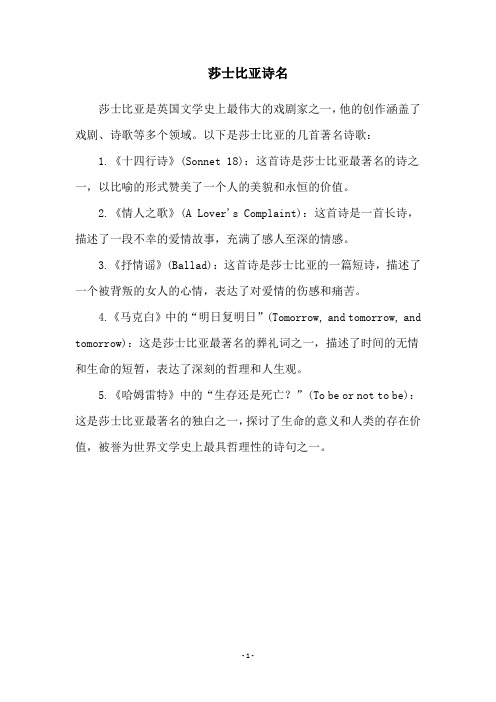
莎士比亚诗名
莎士比亚是英国文学史上最伟大的戏剧家之一,他的创作涵盖了戏剧、诗歌等多个领域。
以下是莎士比亚的几首著名诗歌:
1.《十四行诗》(Sonnet 18):这首诗是莎士比亚最著名的诗之一,以比喻的形式赞美了一个人的美貌和永恒的价值。
2.《情人之歌》(A Lover's Complaint):这首诗是一首长诗,描述了一段不幸的爱情故事,充满了感人至深的情感。
3.《抒情谣》(Ballad):这首诗是莎士比亚的一篇短诗,描述了一个被背叛的女人的心情,表达了对爱情的伤感和痛苦。
4.《马克白》中的“明日复明日”(Tomorrow, and tomorrow, and tomorrow):这是莎士比亚最著名的葬礼词之一,描述了时间的无情和生命的短暂,表达了深刻的哲理和人生观。
5.《哈姆雷特》中的“生存还是死亡?”(To be or not to be):这是莎士比亚最著名的独白之一,探讨了生命的意义和人类的存在价值,被誉为世界文学史上最具哲理性的诗句之一。
- 1 -。
- 1、下载文档前请自行甄别文档内容的完整性,平台不提供额外的编辑、内容补充、找答案等附加服务。
- 2、"仅部分预览"的文档,不可在线预览部分如存在完整性等问题,可反馈申请退款(可完整预览的文档不适用该条件!)。
- 3、如文档侵犯您的权益,请联系客服反馈,我们会尽快为您处理(人工客服工作时间:9:00-18:30)。
the1350s;
2.Perfected by petrarch(13041374); 3.Sir Thomas Wyatt introduced Petrarchan sonnet from Italy into
1.the Italian or Petrachian sonnet;
03
PART THREE
Appreciation of sonnet 18.
03
Sonnet 18
Shall I compare thee to a summer's day? Thou art more lovely and more temperate. Rough winds do shake the darling buds of May, And summer's lease hath all too short a date. Sometime too hot the eye of heaven shines, And often is his gold complexion dimm'd; And every fair from fair sometime declines, By chance,or nature's changing course,untrimm'd; But thy eternal summer shall not fade, Nor lose possession of that fair thou ow'st. Nor shall Death brag thou wander'st in his shade, When in eternal lines to time thou grow'st. So long as men can breathe or eyes can see, So long lives this,and this gives life to thee.
02
The English or Shakespearean sonnet
English sonnet characteristically embodies four divisions of three quatrains(each with a rhyme-scheme of its own) and a
02
Shakespeare wrote 154 sonnets
the first 126 Shankespearean sonnets to a handsome young man
The latter Shakes pearean sonnets are addressed to a 'dark lady 'of ill repute
03
Annotation:
temperate: mild, neither cold nor hot. date: continuous period of time.
the eye of heaven: the son. complexion: face.
dim: make something darkened.
01
Introduction to Shakespeare
The Writing Style
Shakespeare produced most of his known work between
1589 and 1613. His early plays were mainly comedies and histories, genres he raised to the peak of sophistication and artistry by the end of the sixteenth century. He then
final rhymed couplet. The typical rhyme-scheme for the
Shakespear
English is abab cdcd efef gg. The couplet at the end is usually a commentary on the foregoing,an epigrammatic close.
the greatest writer in the English language and the world's pre-eminent dramatist. He is often called England's national poet and the "Bard of Avon". His surviving works, including some collaborations, consist of about 38 plays, 154 sonnets, two long narrative poems, and several other poems. His plays have been translated into every major living language and are performed more often than those of any other playwright.
一个重读音节与一或两个轻读音节按一定的模式搭配起来,有规律的反复出
现就是英文诗歌的节奏。轻读音节是“抑”,重读音节是“扬”如一轻一重,
是抑扬格。抑扬格很符合英文的发音规律,所以在英语诗歌中应用最多的就 是抑扬格,百分之八十以上的英文诗歌都用的是抑扬格
02
Example
Shall I compare thee to a Summer’s day? Thou art more lovely and more temperate; Rough winds do shake the darling buds of May, 最后的音是'ay',归类为‘a'. 最后的音是’te',归类为'b'. 最后的音是'ay',因为之前第一行已
Art: are Est,st:second person singular Hath: has
02
Meter and Feet
The meter of a verse can be described as a sequence of feet, each foot being a specific sequence of syllable types. 某种固定的轻重搭配叫“音步”(foot)。一行诗中轻重 搭配出现的次数叫音步数(meter)
wrote mainly tragedies until about 1608, including
Hamlet, King Lear, and Macbeth, considered some of the finest works in the English language. In his last phase, he wrote tragicomedies, also known as romances, and collaborated with other playwrights.
rediscovered by new movements in scholarship and
performance. His plays remain highly popular today and are constantly studied, performed and reinterpreted in diverse cultural and political contexts throughout the w o r l d .
01
Introduction to ShakespeareHisΒιβλιοθήκη orical evaluation
Shakespeare was a respected poet and playwright in his
own day, but his reputation did not rise to its present heights until the nineteenth century. In the twentieth c e n t u r y, h i s w o r k w a s re p e a t e d l y a d o p t e d a n d
2.the English or Shakespearean
sonnet.
02
Common Sense : Old Poetic Use
Thou : "you" as subject Thee: "you "as object
Thy:"your" followed by a consonant
Thine:" your"followed by a vowel
01
PART ONE
Introduction to Shakespeare.
01
Introduction to Shakespeare
Brief introduction
William Shakespeare (baptised 26 April 1564; died 23 April
1616) was an English poet and playwright, widely regarded as
Sonnets of Shakespeare
CONTENTS
PART ONE
Introduction to Shakespeare.
PART TWO
Sonnets
PART THREE
